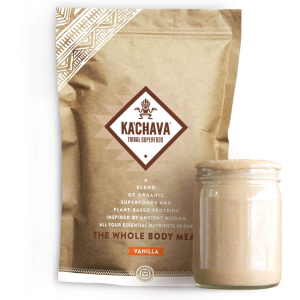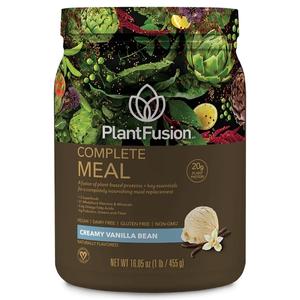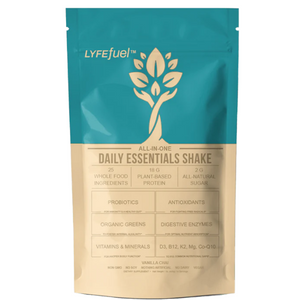5 Best Vegan Meal Replacement Shakes & Powders In 2024
All articles are produced independently. When you click our links for purchasing products, we earn an affiliate commission. Learn more about how we earn revenue by reading our advertise disclaimer.
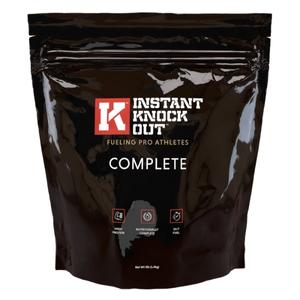
Instant Knockout Complete Meal Replacement
- 35 grams of protein per serving.
- Includes probiotics.
- High in fiber.
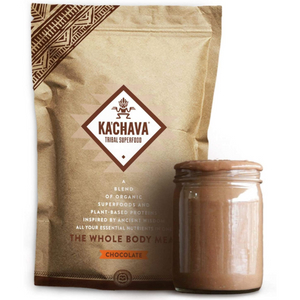
Ka’Chava Superfood
- Free from preservatives and artificial ingredients.
- 100% money-back guarantee.
- Mostly organic ingredients.
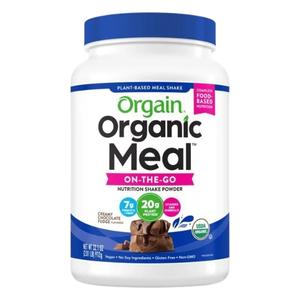
Orgain Organic Meal Powder
- Certified organic.
- No soy.
- Includes a variety of whole grains and legumes.
Following a nutritionally-rich vegan diet can be tricky — especially if you lead a busy, active lifestyle without enough time for meal preparation.
One way to ensure you get all the nutrients you need is by consuming a vegan meal replacement.
What Are Meal Replacement Shakes?
Meal replacement shakes are designed to provide all the essential nutrients you would usually get from a meal — but in the form of a powder you mix with water or plant-based milk to make a shake.
Not all vegan meal replacement shakes are the same, though. Some are more like a vegan meal replacement protein powder with added vitamins, which are great for post-exercise recovery, but not as a replacement for a meal. Others are very low in calories, making them good vegan meal replacement shakes for weight loss.
So what are the best meal replacement shakes for vegans? We’ll get to that soon, but first, who should be using meal replacement shakes?
Best Vegan Meal Replacement Shakes To Buy In (May. 2024)
- Instant Knockout Complete Meal Replacement – Editor’s Choice
- Ka’Chava Superfood – Best Whole Food Plant-Based Meal Replacement Shake
- Orgain Organic Meal Powder – Best Organic Vegan Meal Replacement Shake
- PlantFusion Complete Meal – Best Vegan Replacement Shake For Weight Loss
- LYFE Fuel Daily Essentials Shake – Best Low-Carb Vegan Meal Replacement Shake
Who Should Use Meal Replacement Shakes?
Anyone can use a meal replacement shake, but some people might benefit more than others. You could consider using a vegan meal replacement shake if you:
- Are finding it hard to lose weight with conventional calorie restriction.
- Often forget to take your supplements.
- Don’t have enough time to make three nutritionally-rich meals daily.
- Find it hard to consume a protein-rich meal directly after exercise.
Rather than replacing a meal, you could also add an extra meal to your diet using a meal replacement shake if you need more protein or calories to support an active lifestyle.
Meal replacement shakes are designed for adults and should not be consumed by children.
So, what are the best vegan meal replacement shakes available in 2024? Here are our top five picks.
5 Best Vegan Meal Replacement Shakes To Buy In 2024
Instant Knockout Complete Meal Replacement
Instant Knockout is high in protein and MCTs, making it a great choice for active vegans focusing on muscle growth or body fat loss. However, the high fiber content might be too much if you’re not used to it.
- 35 grams of protein per serving.
- High in medium-chain triglycerides, or MCTs.
- Provides essential vitamins and minerals.
- High in fiber.
- Contains wheat.
- 10 grams of saturated fat per serving.
Instant Knockout Complete Meal Replacement is perfect for active vegans wanting to build muscle. Per serving, it provides 400 calories and a whopping 35 grams of protein.
However, it’s also highest in saturated fat, with 10 grams per serving — that’s already over 50% of your recommended daily allowance.[1]
That’s for a good reason, though. The saturated fats in Instant Knockout mainly come from medium-chain triglycerides, otherwise known as MCTs. Studies suggest these fats have special properties because MCTs can trigger ketosis and might improve body fat loss.[2]
Instant Knockout also provides most of the essential vitamins and minerals required in the diet. The dose of vitamin D is relatively high[3] at 20 micrograms per dose, so you should ensure you’re not supplementing vitamin D from other sources to reduce the risk of overdose.
Finally, Instant Knockout provides probiotics such as Bacillus Coagulans by LactoSpore and Lactobacillus casei. Bacillus coagulans have been shown to survive the acidic environment[4] of the stomach, making it to the colon intact and improving symptoms of irritable bowel syndrome.[5] Moreover, studies show that Lactobacillus casei might improve lipid metabolism[6] and blood sugar balance.[7]
There is only one flavor option: vanilla.
Ka’Chava Superfood
Ka’chava is a low-calorie, high-protein, high-fiber vegan meal replacement shake with added digestive enzymes to promote gut health and nutrient absorption. It’s one of the best vegan meal replacement shakes for weight loss.
- Free from preservatives and artificial ingredients.
- Third-party tested.
- High fiber.
- Contains saturated fat.
- Five grams of added sugars per serving.
- Includes proprietary blends.
Ka’chava claims it is the world’s healthiest meal shake packed with essential vitamins and minerals, digestive enzymes, superfood blends, and soluble fiber. It’s marketed towards those following a vegan diet who want to lose weight.
Indeed, one serving of Ka’chava provides only 240 calories — much less than a meal. Nevertheless, customer reviews say that it is filling, so it makes sense that Ka’chava can help you lose weight due to the fewer calories consumed.
Ka’chava is also high in protein — the most filling macronutrient[8] — providing 25 grams of protein per serving. It includes a range of plant-based protein sources, ensuring you’re getting all nine essential amino acids from yellow organic pea protein, organic whole grain brown rice protein, organic sacha inchi seed, organic amaranth seed, and organic quinoa seed.
Ka’chava includes the enzymes amylase, protease, cellulase, lactase, and lipase to boost the digestion and absorption of nutrients, so nothing is wasted.
Supplementing digestive enzymes can also improve gut symptoms in cases of low digestive enzyme levels,[9] such as lactose intolerance, and is especially beneficial for digestion in older adults due to the natural decrease in digestive enzymes with aging.[10]
Ka’chava comes in a range of flavors, including vanilla, chocolate, matcha, coconut acai, and chai. There is no unflavored option.
Orgain Organic Meal Powder
Orgain Organic Meal Powder is a low-calorie vegan meal replacement shake made with 100% certified organic ingredients. However, it doesn’t provide all the essential nutrients required to supplement a vegan diet.
- Certified organic.
- No soy.
- Includes a variety of whole grains and legumes.
- Doesn’t provide all essential nutrients.
- Not suitable for those with a sesame allergy.
The variety of whole plant-based ingredients in Orgain is impressive. It includes a whole grain blend from a variety of whole grains, including amaranth, quinoa, millet, and buckwheat, and a blend of legumes, including garbanzo and adzuki beans.
All the ingredients are 100% certified organic, too.
We like that Orgain Organic Meal Powder only provides two grams of sugar per serving and contains no added sugars.
However it is low in calories, with only 230 per serving, and also provides less protein and dietary fiber than other vegan meal replacement shakes, with 20 grams of protein and two grams of fiber per serving.
It also provides fewer essential vitamins and minerals — only calcium, potassium, iron, vitamin C, and vitamins B1, B2, B3, B6, and B9. So, if you are following a vegan diet,[11] you will need to take a supplement providing, at a minimum, vitamin B12, vitamin D, and iodine in addition to this meal replacement shake.
Orgain comes in two flavors: Vanilla Bean or Creamy Chocolate Fudge.
PlantFusion Complete Meal
PlantFusion is a very-low-calorie, low-sugar, low-fat vegan meal replacement shake providing protein from a range of plant-based sources and essential nutrients such as vitamin D and B12.
- Contains algae providing protein and fats.
- Low in saturated fat.
- Low in sugar.
- Not enough essential nutrients.
PlantFusion includes an unusual protein blend, with protein sourced from pea protein, artichoke leaf, quinoa, and algae. It also includes extra branched-chain amino acids, which are important for muscle building and recovery:[12] L-valine, L-leucine, and L-isoleucine.
The algal oil also provides essential fatty acids, although the nutritional information doesn’t state how much omega-3 PlantFusion provides.
PlantFusion is very low in calories with only 200 calories per serving — much less than the average meal. It’s also the lowest in sugars of all the shakes we reviewed, with less than one gram per serving. In addition, it’s very low in saturated fat with only one gram per serving.
PlantFusion provides a range of essential nutrients, including vitamin D and vitamin B12, which are important on a vegan diet. However, it is insufficient in other essential nutrients such as vitamin A, iron, calcium, potassium, vitamin K, chromium, magnesium, and zinc, and iodine is not present at all.
One serving doesn’t provide anywhere near all the nutrients you need, so you’ll need to supplement these nutrients from other sources if you only consume one serving of PlantFusion daily.
There are two flavor options: Creamy Vanilla Bean or Chocolate Caramel.
LYFE Fuel Daily Essentials Shake
LYFE Fuel Daily Essentials is a very low-calorie vegan meal replacement shake with less protein than other options, making it best for those wanting to lose weight — but not those with intense training schedules.
- Provides all essential vitamins and minerals.
- Very low in calories.
- Includes probiotics and digestive enzymes.
- Keto-friendly.
- Only 18 grams of protein per serving.
- Very low in fat.
- 1.5 grams of added sugar.
LYFE claims this shake can improve energy balance and aid weight loss. However, they do recommend making a smoothie with nut butter and other ingredients to increase the calorie content for a true meal replacement.
We like that LYFE provides all the essential vitamins and minerals. However, the doses of vitamins D and B12 are very high, so you should ensure you’re not supplementing these nutrients from other sources — including fortified foods.
LYFE is very low in carbohydrates, providing only three grams of net carbs per serving. This makes it perfect for those following a ketogenic diet. However, LYFE is also very low in fat, so it’s best to add a source of fat when consuming LYFE. If you’re not keto, you can also make a smoothie with fruit to add some healthy carbs.
At only 18 grams per serving, LYFE is the lowest of all the vegan meal replacement shakes we reviewed for protein. However, this is still a good amount of protein for those not following a very active lifestyle. It’s sourced from pea protein and organic brown rice protein.
LYFE is sweetened with stevia, a natural sweetener. A 2022 study shows that stevia[13] alters the gut bacteria composition in the microbiome, but further studies are needed to determine the implications of this alteration.
There are just two flavors: chocolate or vanilla.
Benefits Of Using Meal Replacement Shakes
Meal replacement shakes are perfect for those wanting to lose body fat, gain muscle, or to supplement a busy, active lifestyle.
Meal replacement shakes are basically protein shakes with added carbohydrates, fiber, and essential vitamins and minerals. This means they usually provide a good dose of protein per serving, which can support muscle recovery after exercise and aid weight loss.
Also, meal replacements should include most of the essential vitamins and minerals one needs in the diet that you would usually get from a normal meal, so using a meal replacement takes out the need to supplement most nutrients separately.
This is especially important for vegans as a vegan diet is low in certain nutrients, such as vitamin B12 and D. It’s also perfect for people who have problems forgetting to take their supplements.
How To Choose The Best Vegan Meal Replacement Shakes
Every vegan meal replacement shake is different, and you should choose the right meal replacement shake that best suits your needs and lifestyle.
For example, if you have an intense training schedule, you should go for one higher in protein. On the other hand, if you are following a low-carbohydrate or keto diet, you should ensure the shake you choose is low in carbohydrates.
Suffer from gut issues? You might have to try a couple of different vegan protein shakes to find one that suits your gut, but you could be better off on one lower in fiber and including a blend of digestive enzymes.
Finally, if you’re aiming to lose weight, you might want to go for a replacement shake that’s lower in calories. Conversely, if you do a lot of physical activity, you’ll need a shake that’s higher in calories to support your energy output.
Are There Any Side Effects?
There aren’t many adverse effects of using vegan meal replacement shakes, but a few side effects could include:
- Gut symptoms, such as gas or bloating, due to the refined fiber.
- Unwanted weight loss due to lower calorie intake.
- Lower overall diet quality due to eating fewer whole foods.
Final Thought
Vegan meal replacement shakes are a convenient way to get your vitamins and minerals on a vegan diet in a vegan protein shake — especially for those wanting to increase muscle mass.
They are also popular among those wanting to lose weight as they are usually significantly lower in calories than the average meal.
However, a shake can never provide you with all the nutrients you need, and you should ensure you’re consuming it alongside a healthy vegan diet with plenty of whole foods.
Moreover, many shakes include refined and artificial ingredients, such as artificial sweeteners, soy protein isolate, and artificial flavors. So, as with any supplement, be mindful of the ingredient list and choose the best option for your health goals.
Frequently Asked Questions
The best vegan meal replacement shake depends on your needs. For example, if losing weight is your goal, a low-calorie shake might be best for you.
Not all vegan replacement shakes are healthy, as some are high in sugar or contain artificial ingredients. Replacement shakes based more on whole foods are healthier, but no shake is healthier than a real, whole-food meal.
Meal replacement shakes should include all the macronutrients and micronutrients that you’d otherwise obtain from a real meal. A good vegan meal replacement shake should include a balanced mix of carbohydrates, protein, and fats with adequate nutrients representative of a typical meal and emphasizing those nutrients typically low in a vegan diet, such as vitamin B12, vitamin D, and iodine.
High-quality plant-based meal replacement shakes can be good for you, but only when they are consumed as part of a balanced, plant-based diet.
Most research says you can consume one to two meal replacement shakes per day, but that depends on the shake’s quality. Some of the shakes reviewed here would not provide enough nutrition if consumed twice daily with only one whole meal.
+ 13 sources
Health Canal avoids using tertiary references. We have strict sourcing guidelines and rely on peer-reviewed studies, academic researches from medical associations and institutions. To ensure the accuracy of articles in Health Canal, you can read more about the editorial process here
- Center (2022). Daily Value on the New Nutrition Facts Label. [online] U.S. Food and Drug Administration. Available at: https://www.fda.gov/food/new-nutrition-facts-label/daily-value-new-nutrition-and-supplement-facts-labels.
- Mumme, K. and Stonehouse, W. (2015). Effects of Medium-Chain Triglycerides on Weight Loss and Body Composition: A Meta-Analysis of Randomized Controlled Trials. Journal of the Academy of Nutrition and Dietetics, [online] 115(2), pp.249–263. doi:https://doi.org/10.1016/j.jand.2014.10.022.
- Rizzoli, R. (2020). Vitamin D supplementation: upper limit for safety revisited? Aging Clinical and Experimental Research, [online] 33(1), pp.19–24. doi:https://doi.org/10.1007/s40520-020-01678-x.
- Majeed, M., Majeed, S., Arumugam, S., Ali, F. and Beede, K. (2020). Comparative evaluation for thermostability and gastrointestinal survival of probiotic Bacillus coagulans MTCC 5856. Bioscience, Biotechnology, and Biochemistry, [online] 85(4), pp.962–971. doi:https://doi.org/10.1093/bbb/zbaa116.
- Majeed, M., Nagabhushanam, K., Arumugam, S., Majeed, S. and Ali, F. (2018). Bacillus coagulans MTCC 5856 for the management of major depression with irritable bowel syndrome: a randomised, double-blind, placebo controlled, multi-centre, pilot clinical study. Food & Nutrition Research, [online] 62(0). doi:https://doi.org/10.29219/fnr.v62.1218.
- Li, X., Liu, Y., Guo, X., Ma, Y., Zhang, H. and Liang, H. (2021). Effect of Lactobacillus casei on lipid metabolism and intestinal microflora in patients with alcoholic liver injury. European Journal of Clinical Nutrition, [online] 75(8), pp.1227–1236. doi:https://doi.org/10.1038/s41430-020-00852-8.
- Khalili, L., Alipour, B., Asghari Jafar-Abadi, M., Faraji, I., Hassanalilou, T., Mesgari Abbasi, M., Vaghef-Mehrabany, E. and Alizadeh Sani, M. (2019). The Effects of Lactobacillus casei on Glycemic Response, Serum Sirtuin1 and Fetuin-A Levels in Patients with Type 2 Diabetes Mellitus: A Randomized Controlled Trial. Iranian biomedical journal, [online] 23(1), pp.68–77. doi:https://doi.org/10.29252/.23.1.68.
- Freire, R. (2020). Scientific evidence of diets for weight loss: Different macronutrient composition, intermittent fasting, and popular diets. Nutrition, [online] 69, p.110549. doi:https://doi.org/10.1016/j.nut.2019.07.001.
- Ianiro, G., Pecere, S., Giorgio, V., Gasbarrini, A. and Cammarota, G. (2016). Digestive Enzyme Supplementation in Gastrointestinal Diseases. Current Drug Metabolism, [online] 17(2), pp.187–193. doi:https://doi.org/10.2174/138920021702160114150137.
- Rémond, D., Shahar, D.R., Gille, D., Pinto, P., Kachal, J., Peyron, M.-A., Dos Santos, C.N., Walther, B., Bordoni, A., Dupont, D., Tomás-Cobos, L. and Vergères, G. (2015). Understanding the gastrointestinal tract of the elderly to develop dietary solutions that prevent malnutrition. Oncotarget, [online] 6(16), pp.13858–13898. doi:https://doi.org/10.18632/oncotarget.4030.
- Bakaloudi, D.R., Halloran, A., Rippin, H.L., Oikonomidou, A.C., Dardavesis, T.I., Williams, J., Wickramasinghe, K., Breda, J. and Chourdakis, M. (2021). Intake and adequacy of the vegan diet. A systematic review of the evidence. Clinical Nutrition, [online] 40(5), pp.3503–3521. doi:https://doi.org/10.1016/j.clnu.2020.11.035.
- Weber, M.G., Dias, S.S., de Angelis, T.R., Fernandes, E.V., Bernardes, A.G., Milanez, V.F., Jussiani, E.I. and de Paula Ramos, S. (2021). The use of BCAA to decrease delayed-onset muscle soreness after a single bout of exercise: a systematic review and meta-analysis. Amino Acids, [online] 53(11), pp.1663–1678. doi:https://doi.org/10.1007/s00726-021-03089-2.
- Suez, J., Cohen, Y., Valdés-Mas, R., Mor, U., Dori-Bachash, M., Federici, S., Zmora, N., Leshem, A., Heinemann, M., Linevsky, R., Zur, M., Ben-Zeev Brik, R., Bukimer, A., Eliyahu-Miller, S., Metz, A., Fischbein, R., Sharov, O., Malitsky, S., Itkin, M. and Stettner, N. (2022). Personalized microbiome-driven effects of non-nutritive sweeteners on human glucose tolerance. Cell, [online] 185(18), pp.3307-3328.e19. doi:https://doi.org/10.1016/j.cell.2022.07.016.

